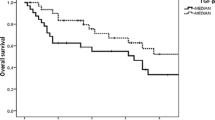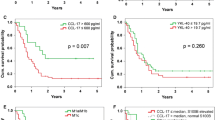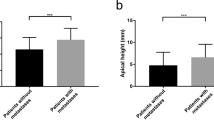Abstract
Transforming growth factor-beta 1 (TGF-β1) plays an important role in the pathogenesis of multiple malignancies, and its expression also strongly affects the outcomes of cancer patients. The objective of this study was to determine the clinical significance of the serum levels of TGF-β1 in melanoma patients. A total of 60 patients with a pathologically confirmed diagnosis of melanoma were enrolled into this study. Serum TGF-β1 concentrations were determined by the solid-phase sandwich ELISA method. Thirty age- and sex-matched healthy controls were included in the analysis. The median age at diagnosis was 53.5 years (range 16 to 88 years). The baseline serum TGF-β1 levels of the melanoma patients were significantly higher than those in the control group (median values 171.85 vs. 19.95 pg/mL, respectively; p < 0.001). The known clinical variables including age of patient, gender, site of lesion, histology, stage of disease, and serum LDH levels were not found to be correlated with serum TGF-β1 concentrations (p > 0.05). However, the chemotherapy-responsive patients had higher serum TGF-β1 levels compared with chemotherapy-unresponsive ones (p = 0.05). Additionally, serum TGF-β1 concentration was a trend to have a prognostic role on survival (p = 0.07). Patients with elevated serum TGF-β1 concentrations had close to significantly favorable overall survival compared to those with lower levels (median 30.1 vs. 20.9 months, respectively). In conclusion, serum levels of TGF-β1 have diagnostic, predictive, and possible prognostic roles in melanoma patients.

Similar content being viewed by others
References
Javelaud D, Alexaki VI, Mauviel A. Transforming growth factor-β in cutaneous melanoma. Pigment Cell Melanoma Res. 2008;21:123–32.
Perrot CY, Javelaud D, Mauviel A. Insights into the transforming growth factor-β signaling pathway in cutaneous melanoma. Ann Dermatol. 2013;25:135–44.
Van Belle P, Rodeck U, Nuamah I, Halpern AC, Elder DE. Melanoma-associated expression of transforming growth factor-β isoforms. Am J Pathol. 1996;148:1887–94.
Rodeck U, Nishiyama T, Mauviel. Independent regulation of growth and SMAD-mediated transcription by transforming growth factor beta in human melanoma cells. Cancer Res 59: 547–550
Lo RS, Witte ON. Transforming growth factor-beta activation promotes genetic context-dependent invasion of immortalized melanocytes. Cancer Res. 2008;68:4248–57.
Krasagakis K, Thölke D, Farthmann B, Eberle J, Mansmann U, Orfanos CE. Elevated plasma levels of transforming growth factor (TGF)-β1 and TGF-β2 in patients with disseminated malignant melanoma. Br J Cancer. 1998;77:1492–4.
Tas F, Duranyildiz D, Oguz H, Camlica H, Yasasever V, Topuz E. Circulating serum levels of angiogenic factors and vascular endothelial growth factor receptors 1 and 2 in melanoma patients. Melanoma Res. 2006;16:405–11.
Conflict of interest
None.
Role of the funding source
None.
Author information
Authors and Affiliations
Corresponding author
Rights and permissions
About this article
Cite this article
Tas, F., Karabulut, S., Yasasever, C.T. et al. Serum transforming growth factor-beta 1 (TGF-β1) levels have diagnostic, predictive, and possible prognostic roles in patients with melanoma. Tumor Biol. 35, 7233–7237 (2014). https://doi.org/10.1007/s13277-014-1984-z
Received:
Accepted:
Published:
Issue Date:
DOI: https://doi.org/10.1007/s13277-014-1984-z




